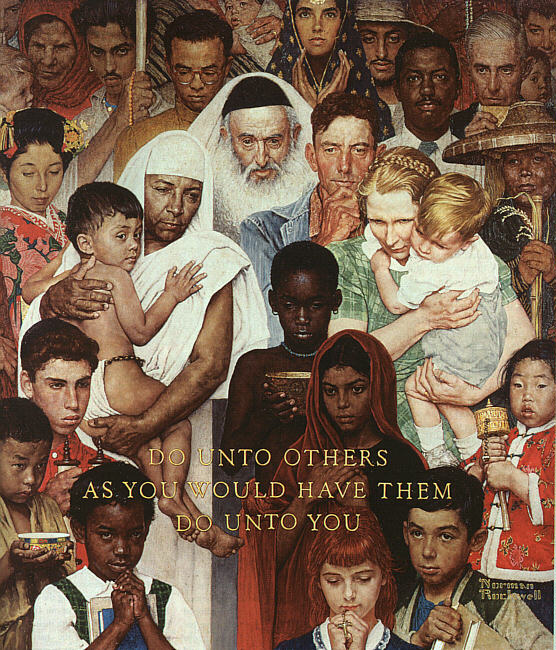联合国网站2月1日载 联合国秘书长潘基文关于世界不同信仰间和谐周的致辞(全文):
对全世界几十亿人来说,信仰是生活的重要基础。在困难的时候,信仰给人们带来力量,使人们感受到同舟共济。绝大多数有信仰者,无论其信仰如何,都与其邻居和睦相处,但每个宗教中都有少数死硬派随时都会以偏执和极端暴力主义行为维护其原教旨主义主张。
这些行为是对各大宗教遗产和教义的侮辱,也有悖于申明人人有权享有思想、良心和宗教自由的《世界人权宣言》。当务之急是增强温和大多数人的力量,使他们能够坚定地反对极端主义势力。但是,只有通过强有力的领导才能实现这一目标。
下个月在维也纳举办的不同文明联盟论坛将继续努力团结不同信仰和文化。宗教和文化领导人无论在世界舞台还是在自己的社区,都有责任宣传宽容和尊重。这就是世界不同信仰间和谐周的核心信息。
我们还必须向青年发出一个希望的信息。青年人往往受到排挤,没有工作,前途也不确定,如遇到狂热分子提供某种事业感和归属感,可轻易成为他们的猎物。我们需要揭露这种诱惑的虚伪性,并提供令人信服的替代方法。
仅靠言辞无法实现这一目标。青年人需要就业,还需要对他们可以信奉的未来有切身利益。联合国目前正在参与制订2015年后的可持续发展议程。我们的目标是在有生之年消除赤贫,并促进人人享有公平的经济机会,同时保护环境。为此,我们需要所有行为者——包括有信仰的青年和宗教界——都跻身其中。
我们生活在一个经济、环境、人口和政治动荡与变革的时代。这些变迁既带来希望,又带来不确定性。我们的工作是确保希望获得胜利,如果各宗教的信徒们为共同事业彼此合作,我们的任务就更容易完成。让我们永远不要忘记,与我们的共同事业相比,我们之间的分歧微不足道。只要共同努力,我们就能够实现和平、繁荣和身心健康等一切目标。
Secretary-General's Message for 2013 World Interfaith Harmony Week
For billions of people around the world, faith is an essential foundation of life.
It provides strength in times of difficulty and an important sense of community. The vast majority of people of faith live in harmony with their neighbours, whatever their creed, but each religion also harbours a strident minority prepared to assert fundamentalist doctrines through bigotry and extreme violence.
These acts are an affront to the heritage and teachings of all major religions. They also contravene the Universal Declaration of Human Rights, which affirms the right of all to freedom of thought, conscience and religion. It is imperative that the moderate majority is empowered to stand firm against the forces of extremism. But, this can only be achieved through strong leadership.
Next month at its forum in Vienna, the Alliance of Civilizations will continue its efforts to unite faiths and cultures. Whether on the world stage or in their communities, religious and cultural leaders have a responsibility to speak the language of tolerance and respect. This is a central message of World Interfaith Harmony Week.
We must also reach out to young people with a message of hope. Too often marginalized, jobless and facing a future of uncertainty, youth can be easy prey for fanatics offering a sense of cause and community. We need to expose the invalidity of this lure and offer a compelling alternative.
This cannot be achieved by words alone. Young people need jobs and a meaningful stake in a future that they can believe in. The United Nations is currently engaged in defining a post-2015 sustainable development agenda. Our goal is to eradicate extreme poverty in our lifetime and promote equitable economic opportunity for all while protecting the environment. To do that, we need the engagement of all actors – including young people and communities of faith.
We live in times of turmoil and transformation – economic, environmental, demographic and political. These transitions bring both hope and uncertainty. Our job is to ensure that hope wins, and our task will be made easier if the followers of all faiths collaborate in common cause. Let us never forget that what divides us is minuscule compared with what unites us. Working together, we can achieve all our goals for peace, prosperity and physical and spiritual well-being.
Ban Ki-moon

黄金法则:己所不欲,勿施于人(Norman Rockwell)
>> 链接:
2月的第一个星期是世界不同信仰间和谐周(World Interfaith Harmony Week),从2011年开始,联合国每年均举行纪念活动。
2010年10月20日,联合国大会通过的第A/RES/65/5号决议宣布,每年2月的第一个星期为所有宗教、信仰与信念之间的世界不同信仰间和谐周,并决定设立世界不同信仰间和谐周,以增强人民之间的相互理解、和谐与合作。
联合国确认,亟须在不同信仰和宗教之间展开对话,以增强人民之间的相互理解、和谐与合作。鼓励所有国家在自愿的基础上,在这个星期内,本着“对神之爱,对邻居之爱”或“对善之爱,对邻居之爱”,在世界各地的教堂、清真寺、犹太教会堂、庙宇和其他礼拜场所,根据其本身的宗教传统或信条,支持传播有关不同信仰间和谐与善意的信息。